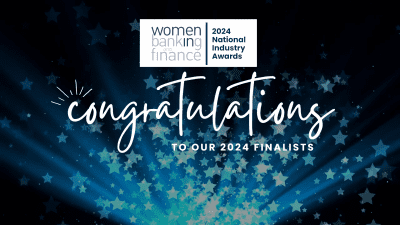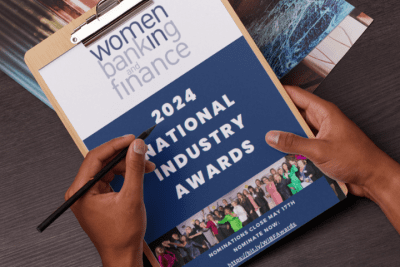Interview with Alicia Chang: Insights into Corporate Finance at Jarden
24 Jul 2024
Recently, WiBF interviewed Alicia Chang, Analyst, Corporate Finance from Jarden, a proud WiBF Bronze Corporate Member to discuss insights on a career in Corporate Finance.

Can you share a bit about your background and what initially drew you to a career in corporate finance?
Corporate finance presented itself as an exciting and natural opportunity that I wanted to pursue due to the rigor of the day-to-day work and the fast-paced nature of the industry. After graduating from Columbia University following four years of college in New York, I knew that I wanted to chase that feeling of working intensely in a fast-paced environment. The responsibility you’re given as a junior in corporate finance versus other industries and other pockets of finance also attracted me, as I place high value on learning from seniors and exposure to clients.
Can you describe a typical day in your role as an Analyst in Corporate Finance?
Most people in my industry will tell you that a day-to-day will vary at any given time due to market conditions, timing in the financial and calendar year, and the nature of your company. At Jarden, I’m fortunate to be working in a smaller team which means that as a first-year analyst, I get the opportunity to take on more responsibility and work across a breadth of deals. At the moment, my morning routine looks something like getting in the office at 8am, catching up on what’s happened overnight through Bloomberg and the Financial Review and dialling into a number of meetings on a few live deals. After lunch is when the brunt of the work happens as we identify action items from those meetings, and as a product team (DCM), we often work on ad-hoc tasks for coverage teams as well such as updating pricing views on a debt product, providing a summary of the current state of the debt capital markets, etc. It’s also exciting to work on pitches for products that we have developed our expertise in, such as convertible bonds and pre-bid stake accumulation. Typically, I’ll wrap up after dinner with colleagues in the office and update for any comments on materials from home.
Why did you choose to pursue a degree in Business and English, and how has this combination of fields benefited you in your career?
I’d firstly like to preface that pursuing a Bachelor of Arts with majors in humanities subjects is somewhat more normal for bankers in the United States, where I obtained my degree. Coming back to Australia, it was definitely a slight shock to realise I was the only B.A. in a sea of commerce and law degrees (which typically aren’t on offer at the undergraduate level in the US). In saying this, I’m grateful for my dual majors in English and Business as they allowed me to hone my written communication skills – which I think are key for any banker working on crafting a pitch – and attention to detail. Granted, I’ve yet to reap the rewards from my seminar on Shakespeare in my corporate finance career, but I’d encourage people from all educational interests and backgrounds to think about a career in corporate finance, as diversity of thought and skillset is, in my opinion, only ever a good thing.
What are some of the most memorable transactions or projects you’ve worked on since joining the DCM team at Jarden?
I’ve been fortunate to work across a breadth of products and transactions with highly experienced colleagues at Jarden. Since starting in October 2023, some of my most memorable projects are ongoing and thus I can’t say much at the moment on them, but it has been really exciting to work on M&A transactions involving ASX-listed companies, and on a debt advisory front to huge refinancings. One exciting deal that we just closed was as Joint Lead Manager on a A$300m convertible bond for the ASX 200 company New Hope – it was an incredibly efficient deal for such a technical product, and two key learnings were definitely on the intricacies of Call Spread transactions, and the interplay between all the parties involved to issue a debt instrument – the company, the banks, the lawyers, the calculation agents, the auditors, the trustees. Convertible bonds have been somewhat few and far between recently in the domestic market (2-3 issuances per year), so it was invaluable to take part in this transaction and experience it first-hand.
What do you enjoy most about working in corporate finance?
One of the most enjoyable aspects of working in corporate finance is how challenging some of the work can be, whether that’s financial and technical analysis that requires a new mode of thinking or crafting up concise and precise messaging for a client. The exposure you get as an analyst to the C-level executives of these household name companies and ASX-listed companies and sponsors is also incredible, and I feel grateful whenever I get the chance to present my work to clients. At Jarden, it’s also great to be able to work with individuals who bring with them a wealth of expertise from their years in the industry and are willing to teach you.
What are some key skills and qualities that you believe are essential for success in corporate finance?
I’d say the top three soft skills that are essential for a successful career in corporate finance are:
1) Being a quick learner
2) Having an eye for detail, and
3) Communication/public speaking skills
All of these are things I’m currently working on as I take on more responsibility, but these skills in practice can look like: spotting the wrong number in a model or the wrong date on a legal document, presenting findings to a client and answering questions smoothly, and not having to be corrected twice on a mistake. Hard skills and technical knowledge are also important, but I think these are critical to being a great analyst.
How do you stay updated with the latest trends and developments in the finance industry, and what resources do you recommend for aspiring corporate finance professionals?
I try to read up where possible – not just local news sources like the AFR and the Australian but also the Wall Street Journal, Financial Times, and New York Times to get a truly global view on what might impact Australian economics. Matt Levine has a fantastic subscription newsletter called Money Stuff which provides digestible recaps of interesting and topical issues. Typically, law firms also publish an M&A handbook and recap of the latest M&A trends, which I’d recommend for aspiring bankers.
What are some of the biggest challenges you’ve faced in your career so far, and how have you overcome them?
A challenge that I faced at the beginning of my career (so not too long ago!) was feeling like there was more to be desired in terms of my technical abilities. As I had never taken finance classes beyond Financial Accounting at college, I was worried that I wouldn’t be up to par. Luckily, the remedy to this has been the great technical training that all graduates receive at corporate finance firms, as well as continuous self-driven learning. I try to take notes whenever I can and keep a glossary of new terms on Excel. I’ve also turned to textbooks to really solidify my technical understanding – such as Hull’s Options, Futures, and Other Derivatives, and I’m not ashamed to say that I probably spend more time on Investopedia.com than the average person. It’s important to not shy away from challenges or perceived weaknesses, but instead tackle them head-on and look to bridge that gap continuously.
What advice would you give to students and recent graduates who are considering a career in corporate finance?
My top tip would be to get experience under your belt when you can, whether this is in the form of an internship, a part-time gig, or attending events held by banks. In my opinion, two weeks on the floor is more beneficial than reading a textbook cover to cover, although that certainly helps. The learning curve and ramp up at the beginning of your career is the steepest, and the sooner that you can get across that and familiarise yourself with the key platforms, technology, terms, and concepts, the better. Through this experience, you’ll also be able to better inform yourself on whether a career in this industry is right for you – if you don’t try, you’ll never know. Try also attending WiBF events for recent graduates. You get to meet amazing speakers who can share their tips & experiences about the industry and its also a great opportunity to connect with other like-minded women.
Can you share any tips on how to secure internships and entry-level positions in the competitive field of corporate finance?
The corporate finance world is certainly competitive, and my best advice would be to polish up your resume through your university grades and activities, hone your technical interview skills, and try to get in front of bankers when you can. Coffee chats are a very valuable networking tool that often act as a conduit to getting a recommendation into corporate finance, and you’ll often also be able to pick up pieces of information that you can speak to in your interviews such as recent public deals the firm has worked on, and specifics on the culture of the firm. By reaching out to an analyst or associate at the firm you’re applying for, you’re able to demonstrate vested interest and build out your network, hopefully building rapport with your future industry colleagues.
Where do you see the future of corporate finance heading, and what opportunities do you foresee for young professionals in this field?
As markets open back up, hopefully M&A activity picks up and we’ll see more public deals and IPOs. This naturally means more exposure for young professionals to all kinds of deals. I also think that this is an exciting moment in the energy transition, Australia’s biotech industry, and AI and data centres, so hopefully we’ll see a few more deals there. Private credit is also having its moment right now, which is interesting for the debt advisory space. I have also recently discovered the WiBF Member Dashboard where I can attend weekly educational webinars for free and resources that help me understand the industry trends. Overall, I see a lot of great opportunities for those like me beginning their careers in corporate finance, and great niches to get involved in.
Alicia Chang’s journey and experiences in corporate finance offer a compelling narrative for those considering this dynamic and challenging field. Alicia’s insights underscore the importance of resilience, ongoing education, and seizing opportunities. Her story echoes the need for continuous learning and highlights the immense power of transferrable skills. As she has shown, a career in corporate finance is not only about technical skills but also about passion for the industry, adaptability, and the drive to succeed. For those wishing to expand their skill set, all WiBF Members have access to unlimited educational webinars, in-person events, as well as programs and masterclasses covering a range of topics across the industry. For more, check out wibf.org.au and create your member dashboard today!
We hope that Alicia’s story inspires you to explore the vast opportunities within corporate finance. Whether you come from a traditional finance background or a diverse educational field, there is a place for you in this ever-evolving industry.
A special thank you to Jarden, a proud WiBF Bronze Corporate Member, for their support and to Alicia Chang for sharing her valuable insights and experiences with us.



